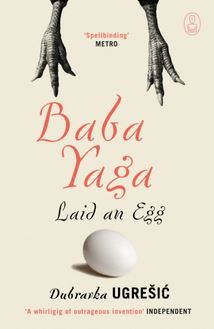-
 Univers
Univers
-
 Ebooks
Ebooks
-
 Livres audio
Livres audio
-
 Presse
Presse
-
 Podcasts
Podcasts
-
 BD
BD
-
 Documents
Documents
-
- Cours
- Révisions
- Ressources pédagogiques
- Sciences de l’éducation
- Manuels scolaires
- Langues
- Travaux de classe
- Annales de BEP
- Etudes supérieures
- Maternelle et primaire
- Fiches de lecture
- Orientation scolaire
- Méthodologie
- Corrigés de devoir
- Annales d’examens et concours
- Annales du bac
- Annales du brevet
- Rapports de stage
La lecture à portée de main
Vous pourrez modifier la taille du texte de cet ouvrage
Découvre YouScribe en t'inscrivant gratuitement
Je m'inscrisDécouvre YouScribe en t'inscrivant gratuitement
Je m'inscrisEn savoir plus
Vous pourrez modifier la taille du texte de cet ouvrage
En savoir plus

Description
Informations
| Publié par | Canongate Books |
| Date de parution | 08 février 2007 |
| Nombre de lectures | 0 |
| EAN13 | 9781847678508 |
| Langue | English |
Informations légales : prix de location à la page 0,0333€. Cette information est donnée uniquement à titre indicatif conformément à la législation en vigueur.
Extrait
CONTENTS
A NOTE ON THE TEXT
CHRYSEIS
THERSITES
HELEN
PANDARUS • AENEAS
THE NURSE
NESTOR
ACHILLES
DIOMEDES • ODYSSEUS
PATROCLUS
SARPEDON • TELAMONIAN AJAX • HECTOR
PHOENIX
ANTILOCHUS
AGAMEMNON
THE RIVER
ANDROMACHE
PRIAM
DEMODOCUS
ANOTHER KIND OF BEAUTY: NOTE ON WAR
A NOTE ON THE TEXT
A few lines to explain the origin of this text. Some time ago I had the idea of reading the entire Iliad in public, to evoke the story as it was originally disseminated in the Homeric world. When I found someone willing to produce such an undertaking (the Romaeuropa Festival, later joined by Torino Settembre Musica and Musica per Roma), it was immediately clear to me that in fact the text as it has come down to us was unreadable, at least as I was imagining: it would take some forty hours and an extremely patient audience. So I thought of intervening, to adapt it to a public reading. I had to choose a translation, and was guided by that of Maria Grazia Ciani, because it was in prose, and because, stylistically, it was close to my own feeling. And then I carried out a series of interventions.
First of all, I made some cuts to suit the patience of a modern audience. I almost never cut entire scenes, but confined myself, as far as possible, to removing repetitions, which in the Iliad are of course numerous, and concentrating the text a little. I tried never to summarise but, rather, to create episodes that were more succinct while still made of portions of the original text. Thus the bricks are Homeric but the mortar and the resulting edifice are transformed.
I said that I almost never cut entire scenes. This is the rule, but there is one obvious exception: I removed all the appearances of the gods. As we all know, the gods intrude quite often in the Iliad , to direct events and sanction the outcome of the war. They are probably the aspect of the poem most extraneous to a modern sensibility, and often break up the narrative, diffusing a momentum that should rightly be palpable. I wouldn’t have removed them if I had been convinced that they were necessary. But – from a storytelling point of view, and only that – they aren’t. The Iliad has a strong structure of human agency that emerges as soon as the gods are sidelined. Behind every action of a god the Homeric text almost always cites a human one that duplicates the divine gesture and brings it, so to speak, down to earth. However much the divine exertions transmit a sense of the incommensurable so familiar in life, the Iliad shows a surprising obstinacy, still, in endowing events with a logic that has man as the ultimate actor. If, therefore, the gods are banished from the text, what remains is not so much a godless and inexplicable world as a very human story in which men live out their destiny as if fluent in a ciphered language whose code they know almost in its entirety. In sum: taking the gods out of the Iliad is probably not a useful way to gain an understanding of Homeric civilisation, but it seems to me a very good way of bringing into relief the essentially human story obscured by the metaphysics of its age, retrieving the story and thus bringing it into the realm of contemporary narrative. As Lukács observed: the novel is the epic of a world deserted by the gods.
The second intervention I made is stylistic. Maria Grazia Ciani’s translation is in a living language rather than a philological jargon. I tried to continue in that vein. From the lexical point of view I tried to eliminate the archaic that would distance us from the heart of things. And then I looked for a rhythm, a consistency of pace, the breath of a particular speed and a special slowness. I did this because I believe that to receive properly a text that comes from so far away in time it is necessary above all to sing it to our own music.
The third intervention is the most obvious, even if not as important as it might seem. I have made the narrative subjective. I chose several characters from the Iliad and let them tell the story, supplanting the external, unitary, Homeric narrator. For the most part, it’s a purely technical move: instead of saying, ‘The father took his daughter in his arms’, in my text the daughter says, ‘My father took me in his arms’. It’s obviously a stratagem dictated by the work’s intended audience, just as Homer’s method was suited to his. When Homer told his story the mythology and the characters were entirely familiar to his listeners. Today’s audience would on the whole not know the particulars. At the same time, its expectations are for a certain intimacy that Homer cannot provide. At a public reading, giving the reader a modicum of personality to lean on, as it were, prevents him from slipping into a boring impersonality. And for the audience of today, hearing the story from those who lived it makes it easier to become involved.
Fourth intervention: naturally, I couldn’t resist the temptation to make a few additions to the text. You will find them in italics, so that there is no equivocation: they are like forthright restorations, in steel and glass, on a Gothic façade. Quantitatively, these interventions make up a minimal percentage of the text. For the most part, they bring to the surface intimations that the Iliad could not express, given its own conventions, but hid between the lines. At times, they pick up pieces of the story handed down by other, later narrators (Apollodorus, Euripides, Philostratus). The most obvious case, although in a way anomalous, is the final monologue, that of Demodocus. As we know, the Iliad ends with the death of Hector and the return of his body to Priam: there is no trace of the horse and the fall of Troy. In the case of a public reading, however, it seemed to me treacherous not to tell how the war finally ended. So I borrowed a scene from the Odyssey (Book 8: at the court of the Phaeacians, an old bard, Demodocus, sings of the fall of Troy in the presence of Odysseus), and I set it inside, so to speak, the translation of some passages from The Destruction of Troy , by Triphiodorus, a book that probably dates from the fourth century AD and is not without a post-Homeric elegance.
The text that I thus obtained was read in public in Rome and Turin in the autumn of 2004, and will probably continue to be read in the future, whenever some courageous producer finds the money to do it. For the record, I’d like to say that more than ten thousand (paying) people were present at the two readings, and that Italian radio broadcast the Rome performance live, to the great satisfaction of drivers on the road and people at home. Numerous cases were confirmed of people who sat in their parked cars for hours, unwilling to turn off the radio. All right, perhaps they were sick of their families, but, anyway, this is just to say that it went very well.
Now the text of this transformed Iliad is about to be translated into various languages, around the world. I realise that this adds paradox to paradox. A Greek text translated into an Italian text, which is adapted into another Italian text and finally translated into a text in, for example, Chinese. Borges would undoubtedly have been ecstatic. The peril of losing the power of the Homeric original is certainly great. I can’t imagine what will happen. But I’d like to warmly thank the publishers and translators who have undertaken to be my travelling companions on one of the most bizarre literary adventures ever contrived.
To the gratitude I feel towards them I’d like to add a homage to three people who helped me immensely during the gestation of this text. I would probably still be thinking about whether to do the Iliad or Moby-Dick if Monique Veaute hadn’t decided, with her matchless optimism, that first I should do the Iliad and then Moby-Dick . What I now know about the Iliad , and didn’t know before, I owe entirely to Maria Grazia Ciani: she followed this strange project with a kindness that I could never have expected. If, finally, the project became a book, I owe it yet again to the care of Paola Lagossi, my teacher and friend.
A.B., MARCH 2005
AN ILIAD
CHRYSEIS
I t all began on a day of violence.
For nine years the Achaeans had besieged Troy: often they needed provisions or animals or women, and then they abandoned the siege and went to get what they wanted by plundering the nearby cities. That day it was the turn of Thebes, my city. They seized what they wanted and took it to their ships.
I was among the women they carried off. I was a beauty: when, in their camp, the Achaean chieftains divided up the spoils, Agamemnon saw me and wanted me for himself. He was the king of kings, and the commander of all the Achaeans: he took me to his tent, and to his bed. He had a wife, at home, called Clytemnestra. He loved her. But that day he saw me and wanted me for himself.
Some days afterwards my father came to the camp. His name was Chryses, and he was a priest of Apollo. He was an old man. He brought splendid gifts and asked the Achaeans, in exchange, to set me free. As I said: he was an old man and a priest of Apollo. All the Achaean chiefs, after seeing and listening to him, were in favour of accepting the ransom and honouring the noble figure who had come to them as a suppliant. Only one among them was not won over: Agamemnon. He rose and railed brutally against my father, saying to him, ‘Go away, old man, and don’t show yourself again. I will not give up your daughter: she will grow old in Argos, in my house, far from her homeland, working at the loom and sharing my bed. Go now, if you want to go with your life.’
My father, frightened, obeyed. He went away in silence and disappeared along the shore of the sea – you might have said into the sound of the sea. Then, suddenly, death and suffering fell upon the Achaeans. For nine days, arrows flew, killing men and beasts, and the pyres of the dead
-
 Univers
Univers
-
 Ebooks
Ebooks
-
 Livres audio
Livres audio
-
 Presse
Presse
-
 Podcasts
Podcasts
-
 BD
BD
-
 Documents
Documents
-
Jeunesse
-
Littérature
-
Ressources professionnelles
-
Santé et bien-être
-
Savoirs
-
Education
-
Loisirs et hobbies
-
Art, musique et cinéma
-
Actualité et débat de société
-
Jeunesse
-
Littérature
-
Ressources professionnelles
-
Santé et bien-être
-
Savoirs
-
Education
-
Loisirs et hobbies
-
Art, musique et cinéma
-
Actualité et débat de société
-
Actualités
-
Lifestyle
-
Presse jeunesse
-
Presse professionnelle
-
Pratique
-
Presse sportive
-
Presse internationale
-
Culture & Médias
-
Action et Aventures
-
Science-fiction et Fantasy
-
Société
-
Jeunesse
-
Littérature
-
Ressources professionnelles
-
Santé et bien-être
-
Savoirs
-
Education
-
Loisirs et hobbies
-
Art, musique et cinéma
-
Actualité et débat de société
- Cours
- Révisions
- Ressources pédagogiques
- Sciences de l’éducation
- Manuels scolaires
- Langues
- Travaux de classe
- Annales de BEP
- Etudes supérieures
- Maternelle et primaire
- Fiches de lecture
- Orientation scolaire
- Méthodologie
- Corrigés de devoir
- Annales d’examens et concours
- Annales du bac
- Annales du brevet
- Rapports de stage















